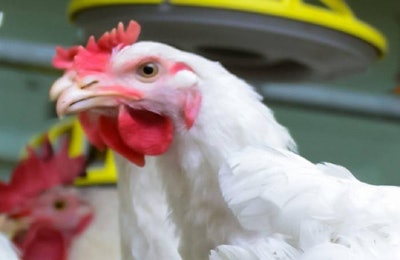
While the outlook for the European Union (EU)’s poultry industry may be broadly positive, the sector is feeling over-burdened with rules and regulations that are increasing costs, damaging sustainability, and resulting in producers leaving the industry.
At the EuroTier International Poultry Event I: "Poultry business - Quo vadis?" industry leaders highlighted the need for a more stable operating environment, less regulatory change, and additional support to ensure that, if consumers want higher standards, they pay producers’ additional costs.
Immediate issues
Per capita chicken meat consumption has risen in the EU over the last decade and the bloc has 113% self-sufficiency. This, together with the sector’s high standards would appear to indicate success, however, according to Leopold Graf Von Drechsel, president of the European Poultry Club, the industry faces huge challenges and is underappreciated.
The daily challenges for European producers are huge, he continued, and are currently being exacerbated by three factors in particular.
The region is confronting its worst outbreak of avian influenza ever. The disease is a huge handicap for affected exporting countries. African swine fever, while to date only in wild boar, has resulted in numerous Asian markets closing to European exports, putting pressure on European meat prices. Alongside these two disease issues are the changed and reduced demand patterns for chicken meat resulting from COVID-19 control measures.
The above have led to oversupply and falling prices, meaning that producers cannot cover costs, and this being compounded by significantly rising feed prices.
With high costs and weak demand, the situation is severe.
Irrespective of rising feed costs, the sectors’ production costs are high. Among the many consequences of this will be that, long-term, its export position will be increasingly challenged.
More support needed
Von Drechsel’s views were echoed by Friedrich-Otto Ripke, President of the German Poultry Association (ZDG).
Looking to Germany, he noted that, being a developed country, society tends to be critical of industry and that this was leading to significant debate around the poultry industry. The pressures on the industry in Germany are more intense than in other countries, noted.
According to Ripke, the country, along with Austria and Sweden, has the highest animal husbandry standards in the world. This results in high costs, due to, for example, tough rules on emissions and medicine usage.
In Germany, there is particular concern at the direction of politics, he continued. Non-governmental organizations have persuaded government to see the poultry industry as mass producers, with all the criticism that this entails, and farmers are leaving the sector.
The industry needs a framework that will ensure it remains economically sustainable, with stability to plan, an end to the flood of regulatory changes and, re-imbursement for additional costs.
Where reimbursement is concerned, he noted that consumers want higher welfare but are not always prepared to pay for it. A consumer welfare levy to cover this may be a way forward and, to implement this, he called for a national levy, collected by supermarkets, accompanied by a labeling scheme. The labeling scheme would indicate both welfare practices and country of origin to allow consumers to know where their meat has come from and how it was produced.
He continued that the sector had resisted a number of trade agreements precisely to preserve the industry’s high standards, a view echoed by Von Drechsel, who noted that it would be a shame to put food production into the hands of others operating to lower standards.
Common cause
Working together may offer solutions to some of the highlighted at the event.
Hubertus Paetow, German Agricultural Society (DLG) president, noted that the while the industry is facing numerous pressures, including, for example, the issues of male chicks and antibiotic reduction, it is also benefitting for demand for chicken meat that continues to rise globally.
He continued that these challenges keep the industry on its toes but that, by working together, they can be overcome. No other industry is as integrated as the poultry industry and the way that its members relate to each other and how each part of the production chain takes responsibility for confronting issues works to the common good, he noted.
Where there are common goals there can be progress. Goals are no longer simply national, he argued, they are influenced by international factors, as well as by political and social demands. All of these aspects need to be considered and, it is worth remembering that there is often value in taking a broader focus and looking outside of your immediate bubble.


















